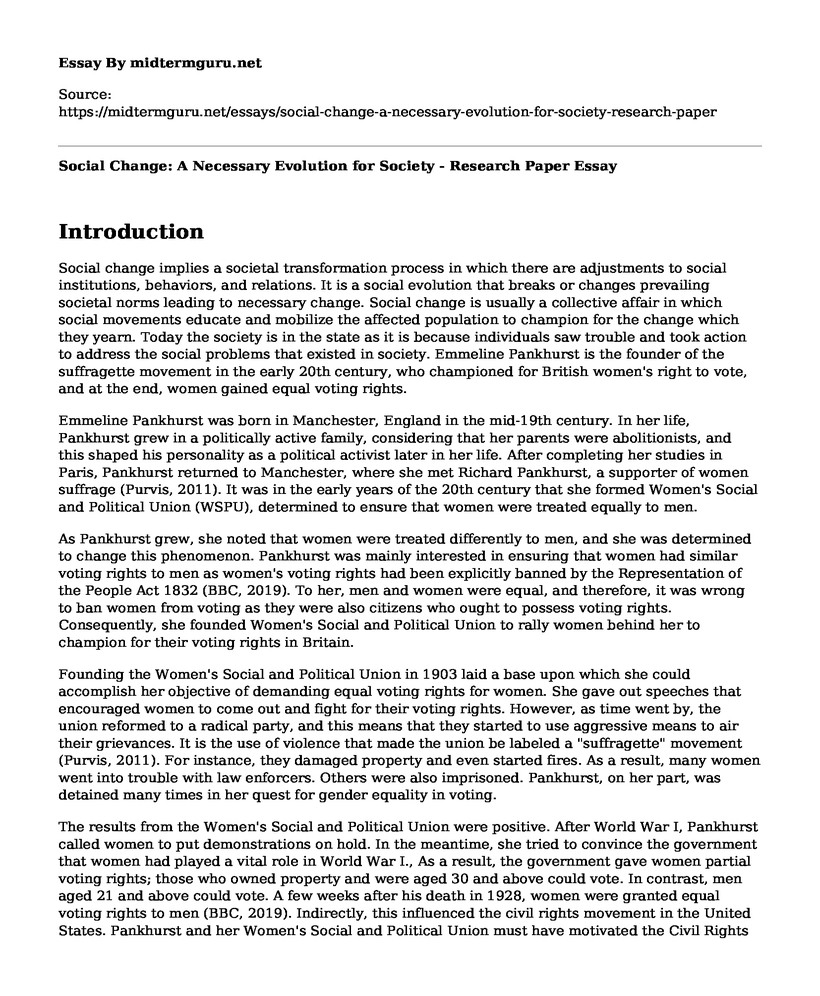Introduction
Social change implies a societal transformation process in which there are adjustments to social institutions, behaviors, and relations. It is a social evolution that breaks or changes prevailing societal norms leading to necessary change. Social change is usually a collective affair in which social movements educate and mobilize the affected population to champion for the change which they yearn. Today the society is in the state as it is because individuals saw trouble and took action to address the social problems that existed in society. Emmeline Pankhurst is the founder of the suffragette movement in the early 20th century, who championed for British women's right to vote, and at the end, women gained equal voting rights.
Emmeline Pankhurst was born in Manchester, England in the mid-19th century. In her life, Pankhurst grew in a politically active family, considering that her parents were abolitionists, and this shaped his personality as a political activist later in her life. After completing her studies in Paris, Pankhurst returned to Manchester, where she met Richard Pankhurst, a supporter of women suffrage (Purvis, 2011). It was in the early years of the 20th century that she formed Women's Social and Political Union (WSPU), determined to ensure that women were treated equally to men.
As Pankhurst grew, she noted that women were treated differently to men, and she was determined to change this phenomenon. Pankhurst was mainly interested in ensuring that women had similar voting rights to men as women's voting rights had been explicitly banned by the Representation of the People Act 1832 (BBC, 2019). To her, men and women were equal, and therefore, it was wrong to ban women from voting as they were also citizens who ought to possess voting rights. Consequently, she founded Women's Social and Political Union to rally women behind her to champion for their voting rights in Britain.
Founding the Women's Social and Political Union in 1903 laid a base upon which she could accomplish her objective of demanding equal voting rights for women. She gave out speeches that encouraged women to come out and fight for their voting rights. However, as time went by, the union reformed to a radical party, and this means that they started to use aggressive means to air their grievances. It is the use of violence that made the union be labeled a "suffragette" movement (Purvis, 2011). For instance, they damaged property and even started fires. As a result, many women went into trouble with law enforcers. Others were also imprisoned. Pankhurst, on her part, was detained many times in her quest for gender equality in voting.
The results from the Women's Social and Political Union were positive. After World War I, Pankhurst called women to put demonstrations on hold. In the meantime, she tried to convince the government that women had played a vital role in World War I., As a result, the government gave women partial voting rights; those who owned property and were aged 30 and above could vote. In contrast, men aged 21 and above could vote. A few weeks after his death in 1928, women were granted equal voting rights to men (BBC, 2019). Indirectly, this influenced the civil rights movement in the United States. Pankhurst and her Women's Social and Political Union must have motivated the Civil Rights movement that they would also win in their quest.
Emmeline Pankhurst is the founder of the suffragette movement in the early 20th century, who championed for British women's right to vote, and at the end, women gained equal voting rights. Interestingly, her activism work must have motivated the Civil rights movement in their quest for equality. It is an indication that social change in different society is interconnected in one way or the other regardless of existing geographical barriers.
References
BBC. (2019). Emmeline Pankhurst - Suffragette. Retrieved 6 August 2019, from https://www.bbc.co.uk/bitesize/articles/zh7kdxs
Purvis, J. (2011). Emmeline Pankhurst (1858-1928), Suffragette Leader and Single Parent in Edwardian Britain. Women's History Review, 20(1), 87-108. doi: 10.1080/09612025.2011.536389
Cite this page
Social Change: A Necessary Evolution for Society - Research Paper. (2023, Feb 02). Retrieved from https://midtermguru.com/essays/social-change-a-necessary-evolution-for-society-research-paper
If you are the original author of this essay and no longer wish to have it published on the midtermguru.com website, please click below to request its removal:
- Paper Example on Gender and Gender Roles
- The Epidemic of Teenage Suicide - Paper Example
- A Hope for Poor Countries' Survival - Essay Sample
- Japanese Foreign Policy: National Diet & Prime Minister Oversight - Essay Sample
- Ethnic Segregation: Local to Global Scale Implications - Essay Sample
- Canada: Protecting the Environment in an Industrialized Nation - Research Paper
- Who Killed Reconstruction - Essay Sample







